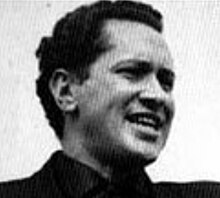
Back كاميلو توريس ريستريبو Arabic كاميلو توريس ريستريبو ARZ Каміла Торэс Рэстрэпа Byelorussian Camilo Torres Restrepo Catalan Camilo Torres Restrepo Czech Camilo Torres German Καμίλο Τόρες Greek Camilo Torres Restrepo Spanish Camilo Torres Restrepo Basque کامیلو تورس رسترپو Persian
The Reverend Father Camilo Torres Restrepo | |
|---|---|
 Camilo Torres | |
| Born | Camilo Torres Restrepo 3 February 1929 |
| Died | 15 February 1966 (aged 37) |
| Nationality | Colombian |
| Occupation(s) | Priest Guerilla |
| Parent(s) | Calixto Torres Umaña Isabel Restrepo Gaviria |
| Religion | Christianity |
| Church | Roman Catholic Church |
| Ordained | 1954 (priest) |
Camilo Torres Restrepo (3 February 1929 – 15 February 1966) was a Colombian Roman Catholic priest, a proponent of Marxism-Leninism and liberation theology, and a member of the National Liberation Army (ELN). During his life, he tried to reconcile revolutionary Marxism and Catholicism. His social activism and willingness to work with Marxists troubled some.[1]
As part of the academic staff of the National University of Colombia, he was a co-founder of the Sociology Faculty together with Orlando Fals Borda, as well as some intellectuals such as Eduardo Umaña Luna, María Cristina Salazar, Virginia Gutiérrez de Pineda, Carlos Escalante, Darío Botero and Tomás Ducay, in 1960.[2]
His involvement in several student and political movements during the time won him a large following as well as many detractors, especially from the Colombian government and the church itself. Due to the growing pressure to back down from his radical politics, Camilo Torres was persecuted and went into hiding (leaving his job as an academic) by joining the guerrillas in Colombia. He served as a low-ranking member of the ELN to whom he also provided spiritual assistance and inspiration from a Catholic Christian communist point of view. He was killed in his first combat engagement when the ELN ambushed a Colombian Military patrol.[3][4] After his death, Camilo Torres was made an official martyr of the ELN.
He is perhaps best known for the quote: "If Jesus were alive today, He would be a guerrillero."[5] Camilo Torres, along with Gustavo Gutierrez, Helder Camara and Des WIlson, is one of the most important figures in the history of liberation theology. He was a life-long friend of fellow socialist Luis Villar Borda and Colombian writer Gabriel García Márquez. In the Dominican Republic in 1970, a revolutionary group that included Catholic clergy members and university students was founded under the name CORECATO, which stood for Comando Revolucionario Camilo Torres (Revolutionary Command Camilo Torres). In New York City, San Romero of the Americas Church-UCC has founded the Camilo Torres Project in 2009. This project works for social justice and peace for the people of the Washington Heights community.
- ^ Bushnell, David. "Camilo Torres Restrepo". Encyclopedia of Latin American History and Culture, v. 5, 258-59
- ^ "A 51 años de la muerte de Camilo Torres: "Insistamos en lo que nos une y prescindamos de lo que nos separa" (51 years after the death of Camilo Torres: "Let us insist on what unites us and do without what separates us")" (in Spanish). Colombia: Desinformémonos. 15 February 2017. Retrieved 27 June 2022.
- ^ Bushnell, "Camilo Torres Restrepo", 259.
- ^ SDS Regional Newsletter, Mar. 8, 1966, Vol. 1, no. 8 [1] Winter 1966 MFU Catalog [2]
- ^ Jiménez, Fiorella López (2011). "If Jesus Were Alive Today, He Would be a Guerrillero": The Impact of Liberation Theology Movements in Latin American Politics. Lake Forest College.
© MMXXIII Rich X Search. We shall prevail. All rights reserved. Rich X Search